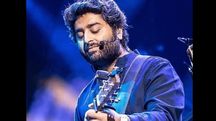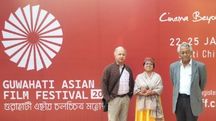The Listener Brahmaputra: A Tapestry of Voices and Memories
The mighty Brahmaputra, an eternal witness to the rise and fall of civilizations, carried more than just the weight of time upon its waters. It carried stories—whispers of ancient myths, echoes of forgotten voices, and the living pulse of oral traditions passed down through generations.

The mighty Brahmaputra, an eternal witness to the rise and fall of civilizations, carried more than just the weight of time upon its waters. It carried stories—whispers of ancient myths, echoes of forgotten voices, and the living pulse of oral traditions passed down through generations.
At “The Listener: Brahmaputra” - A Festival of Oral Literature, these voices found their space to breathe, to be heard, and to resonate beyond time.
Organized by IMASI: The Maharaj Kumari Binodini Devi Foundation in collaboration with The Royal Global University, the festival unfolded over three immersive days from February 10 to 12, 2025, at Royal Global University, culminating in an unforgettable cruise aboard the MV Kohuwa Bon. It was more than just a cultural or academic gathering—it was a celebration of storytelling in its purest, most unfiltered form. From whispered folktales of ancient lands to the powerful oral histories of resilience and resistance, The Listener Brahmaputra became a vessel of voices, some forgotten, some struggling to survive, and others flowing strong—like the river itself, especially in our state.
A Tapestry of Voices
The festival commenced with a deeply moving keynote address by Prof. Stephen Morey of La Trobe University, a scholar known for his pioneering work in endangered languages and oral traditions. Morey set the tone by highlighting the urgency of documenting and revitalizing the spoken word. He emphasized the remnants of cultures that still linger in the air, in songs, in prayers, and in the rhythmic cadences of elders’ voices. He spoke about his extensive research on the Tai Phake languages.
Also Read: Northeast International Documentary and Film Festival returns for a grand 3rd edition in Guwahati
An air of reverence fell as the Pali prayers of the Theravada Buddhism of the Singpho of Arunachal Pradesh were chanted, their cadence a link to an ancient spiritual continuum. The OjaPali performance from Assam transported audiences to a time when oral epics were passed down through dance and music, while the Bodo and Manipuri performances added their distinct voices to this grand symphony of cultures. Sanjoy Hazarika, a renowned author, journalist, and filmmaker, presented an insightful, illustrated introduction to the Brahmaputra River, tracing its journey from Tibet to the Bay of Bengal.
The festival became a confluence where cultures met, where the river carried voices across lands and generations. The Goalpariya music of Assam breathed nostalgia into the air, while storytellers from Lithuania, Milda Varnauskaite, and Takhellambam Shyamkanhai from Manipur reminded us that though languages differ, the heart of storytelling remains universal. The session was moderated by Ambassador Diana Mickeviciene of Lithuania. Moreover, the pioneering work of ethnomusicologist Nihar Barua of Gauripur was honored—a tribute to those who archive melodies before they are lost in the winds of time.
Storytelling Through Art, Taste, and Memory
Art spoke in ways that words could not, as Dhiraj Rabha’s art installation explored the visualization of memories from detention camps, a stark reminder that storytelling is also about remembrance and resistance. He was in conversation with Professor Rishi Barua of Shantiniketan. The senses were further awakened by the Singpho tea-tasting experience, an immersion into the rich tea traditions of a people whose stories are woven into every cup, and by the new Naga fusion cuisine from the Nagaland Chef, where flavors became metaphors for tradition and transformation.
In a world where oral traditions are often overshadowed by digitized immediacy, the festival also delved into the role of digitization and emerging technology in preserving oral heritage. Voices, once confined to the fleeting moments of a performance, can now be immortalized, ensuring that the wisdom of ancestors finds its way into the future.
The River Listens, The Legacy Continues
As the MV Kohuwa Bon glided through the Brahmaputra on the final day, it felt as though the river itself was listening. “Oral literature is memory, emotion, and wisdom passed through generations. This festival was an act of listening and preservation,” reflected curator L. Somi Roy, his words rippling across the gathering like waves. Festival Director and event lead Dr. Shiela Bora added, “To celebrate oral literature is to celebrate cultural diversity. The Brahmaputra has been a listener for centuries, and through this festival, it continues to carry voices forward.”
And so, as the last story was told and the final song sung, The Listener Brahmaputra left behind more than echoes—it left behind a promise, whispered by the river, that stories will never fade as long as there are listeners.
Reflecting on the festival, curator L. Somi Roy further remarked, “Oral literature is more than storytelling; it is memory, emotion, and the wisdom of generations encoded in voice. This festival was not just an event; it was an act of listening, an act of preserving what should never be forgotten.”
As the cruise gently made its way back to shore, it became clear that this was not just a three-day event—it was a movement, a promise. The Listener Brahmaputra had done something profound: it had reminded people to listen. Because in listening, we preserve; in remembering, we honor; and in storytelling, we ensure that no voice is ever truly lost to time.
The Brahmaputra remains. And so do its stories.
Copyright©2026 Living Media India Limited. For reprint rights: Syndications Today









